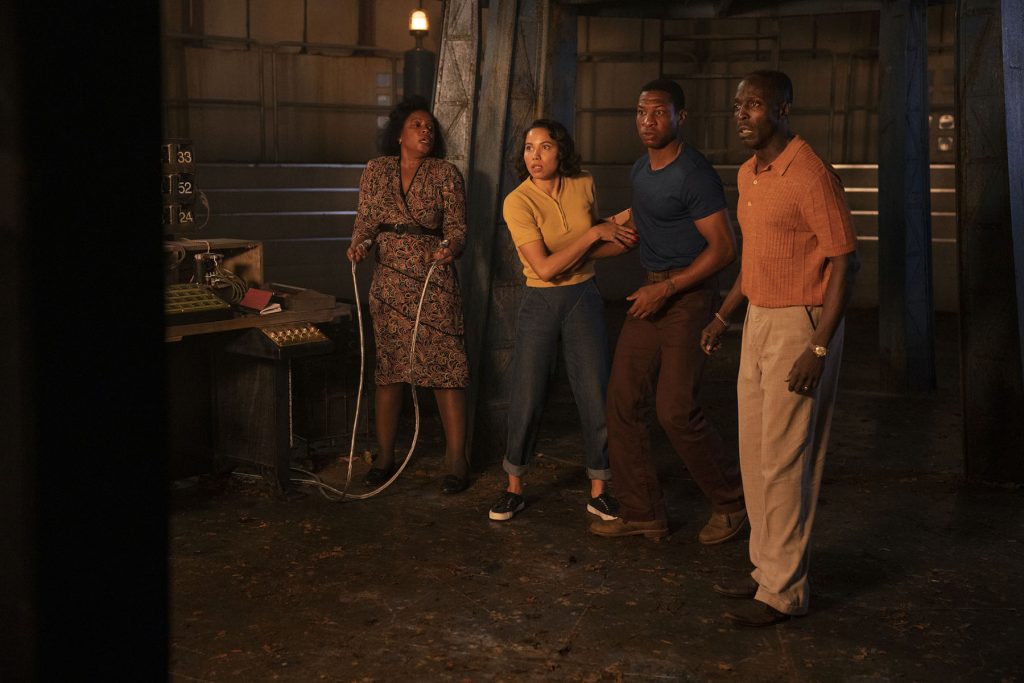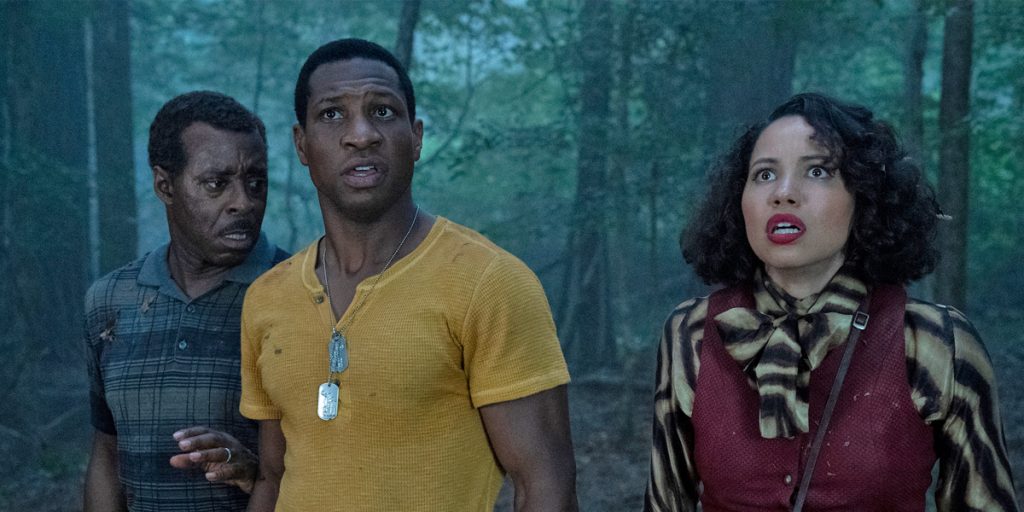Despite some tonal problems, Lovecraft Country is a success propelled by strong design and aesthetics, and an excellent cast.
I often equate HP Lovecraft to the likes of Bob Dylan or Stanley Kubrick: I may not necessarily be a fan of their work, but I respect them for their influence in their respective mediums, and I appreciate how they’ve influenced so many artists that I love now. While I truly do enjoy his eldritch horror aesthetics, I find Lovecraft’s actual stories to be a challenge to get through, but not in a good way. Despite the fact that Lovecraft’s work is difficult to read on several levels, there’s no denying his influence over everyone from Stephen King, to Guillermo Del Toro, to John Carpenter, to Metallica, to Scooby Doo, to World of Warcraft.
Among the more recent additions to the genre of “Taking the aesthetics of Lovecraft and making them more palatable” is HBO’s series Lovecraft Country, based on Matt Ruff’s book of the same name. The show primarily focuses on a black family from South Chicago against a backdrop of America during the 1950s. Atticus (Jonathan Majors), a Korean War veteran, travels to Massachusetts with his uncle George (Courtney B. Vance) and friend Letitia (Jurnee Smollett) to help with George’s “Safe Negro Travel Guide.” When they arrive, they discover dark secrets that will change their lives forever.
Before I get ahead of myself, let me put two big ol’ disclaimers here: First, I have not read the book on which the show is based. I’m kicking myself because it has been sitting on my shelf for the better part of a year and I still haven’t gotten around to reading it. Because of this, I can’t compare the show to its source material and I can only focus on the series I have in front of me. Second, I should not be treated as an authority on either racism or black culture in America. My privilege prevents me from experiencing many of the lasting effects of the oppressive systems of power and privilege prevalent that are presented in the show, and continue to affect the USA. What I’m saying here is, I’m trying to give you as fair of an opinion and analysis of the show as I can, but I’m certain that I have some blind spots, so consider taking what I have to say with a few healthy pinches of salt.

Off the bat, I have to commend the entire main cast; there’s not a weak one in the bunch. Lovecraft Country makes heavy use of extreme closeups during intense moments, and every actor does an excellent job displaying nuanced and subtle emotions mixed in with the big ones using nothing but their faces. I want to especially note Jamie Chung’s performance as a Korean nurse: there’s an episode that is mostly in Korean, and if you ignore the subtitles and rely solely on the visual story-telling, you’ll notice how Chung is able to convey so much just through her face, movements, and vocal timbre. She is still able to tell you a compelling story even though you may not have any idea what she is saying.
I also need to applaud the visual effects and design teams. While some of the effects don’t always look amazing, Lovecraft Country is partially a celebration of the pulpy aesthetics presented in Lovecraft’s work. There’s definitely an element of pulp and camp in the show’s visual presentation, but I never found it to be detracting from the narrative. The designs of the monsters in the show are harrowing, whether they be supernatural or all-too-human. I also want to commend some of the body horror that occurs in the second half of the season: these sequences are revolting in the best possible way, and will probably haunt you if you have a weak stomach. Let’s just say that Cronenberg would be proud.
While there is a lot to like about Lovecraft Country, one of its biggest issues could be summarized in one word: tone. It’s kind of all over the place. First, while every episode tends to be consistent to itself (there are actually a few episodes I think would make excellent stand-alone movies with some tweaking), the show’s tone can vary drastically from episode to episode. One episode is a self-contained love story about two star-crossed lovers on conflicting sides of the Korean War, while the episode that directly follows is borderline whimsical with a character exploring infinite possibilities across infinite realities, all sandwiched between full-on horror episodes featuring demons and the aforementioned gnarly body horror. This may not be a problem for some viewers, but the show might be a difficult sell if an inconsistent tone is a dealbreaker for you.
Also, remember when I discussed how I liked the show’s pulpy sensibilities? Well, I stand by that statement, but the pulp and camp coexist with the very real horror of American racism. Now, it is not impossible to make these two things coexist, and Lovecraft Country on many occasions is able to make it work. But there are times when the fun campy style of horror clashes with the more grounded and “realistic” horrors, and it ends up creating some uncomfortable dissonance. The camp and the realistic sides of the show are both done really well in and of themselves, but it’s when these two styles try to coexist that you start to get some tonal whiplash. This becomes especially prevalent when the show addresses real life events like Emmett Till’s murder or the Tulsa Race Massacre. I’m sorry if I’m being vague here, but it’s hard to talk about this in depth without delving into spoilers.
Finally, I do have one more critique, but this is more of a personal bugaboo than an objective criticism; when you hear the name “Lovecraft,” what comes to mind? To me, it’s eldritch horror, filled with fish-themed alien worlds, the abyss of the unknown, and dark, forbidden secrets that mankind was never meant to know. Lovecraft Country, however, has very little in the way of what I would call “eldritch horror.” It delves into the horror and sci fi genres for sure, but the horror is more supernatural, focusing on haunted houses, witches, curses and the like. Again, this may be a complete non-issue for you, but to me, “Lovecraft” is a loaded word that gives a certain expectation for the aesthetics you may find within. When there’s not much in the way of “Lovecraftian” horror in Lovecraft Country, it feels a little misleading, you know?
This review has already gone on for a while, and I haven’t even gotten to address the show’s representation of queer folk of color, how Massachusettsans spoke with southern accents, some of the baffling soundtrack choices, or the way the show masterfully uses the song “Tutti Frutti” to both juxtapose the lives and experiences of white and black Americans, and to address the fetishization and commodification of black art in white culture. Lovecraft Country leaves you with a lot to talk about, and while it’s not without its faults, when the show succeeds, it results in exceptional television. If you’re at all curious about the show, I would easily recommend that you give it a try.

